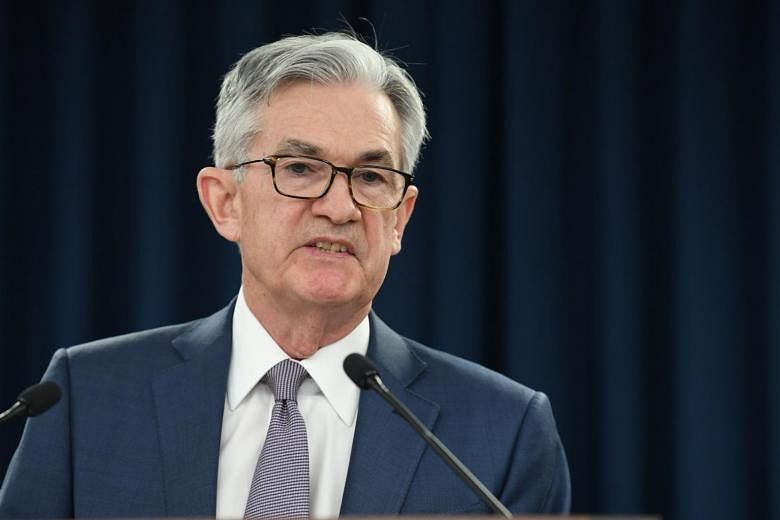WASHINGTON (AFP, BLOOMBERG, REUTERS) - The business shutdowns caused by the coronavirus pandemic could "easily" cause the US economy to collapse by 20 to 30 per cent this quarter, Federal Reserve chairman Jerome Powell said on Sunday (May 17).
But although unemployment could peak at 20 to 25 per cent, a level not seen since the 1930s, Powell said the country will avoid another depression.
"I think there's a good chance that there'll be positive growth in the third quarter," Powell told the CBS news programme 60 Minutes.
"Assuming there is not a second wave of the coronavirus, I think you will see the economy recover steadily through the second half of this year," he said. "For the economy to fully recover people will have to be fully confident and that may have to await the arrival of a vaccine."
Powell took care not to promise a swift, so-called V-shaped rebound. "This economy will recover. It may take a while," he said. "It could stretch through the end of next year. We really don't know."
In the interview, the central bank chief repeatedly returned to health issues as central to the success of a US economic reopening, calling on Americans to "help each other through this" by adhering to social distancing rules as state and local governments begin to lift restrictions on social and economic activities.
"If we are thoughtful and careful about how we reopen the economy so that people take these social distancing measures forward and try to do what we can not to have another outbreak...then the recovery can begin fairly soon," Powell said.
States are now easing restrictions imposed to slow the spread of the coronavirus. That has raised the hope of a gradual return to normal, but also has increased the risk of new infections. As Congress debates possible further economic relief, Powell has stretched the limits of typical central bank commentary, directly calling for more fiscal spending. In Sunday's interview, he even urged people to wash their hands and wear masks to aid the recovery.
Under the best of circumstances it will be a long road, Powell said, with additional job losses likely through June, a rebound that takes time to "gather steam," and some parts of the economy like the travel and entertainment industries possibly under pressure until there is a vaccine.
In the meantime, he said, the Fed and Congress may need to do more to ensure people can pay their bills. US lawmakers beginning in March committed US$3 trillion (S$4.28 trillion) to offset job losses and other economic troubles related to the pandemic. They are debating whether to do more. The Fed has approved a suite of programs as well to help businesses and financial markets function during the pandemic, and to try to limit personal and corporate bankruptcies.
Powell, who appears before the Senate Banking Committee on Tuesday to discuss how those rescue efforts are working, on Sunday said a longer lifeline may be needed.
"By keeping people and businesses out of insolvency just for maybe three to six more months....we can buy time with that," as health authorities work on virus control. "That kind of support may be appropriate."
Powell also stressed that the central bank hadn't exhausted its options for aiding the economy.
"We're not out of ammunition," he said of the central bank and its willingness to expand existing programs or add new ones. "Not by a long shot."
Powell noted the Fed can increase its emergency lending programs and make monetary policy more supportive through forward guidance and by adjusting the Fed's asset-purchase strategy. That could be a veiled reference to yield curve control, where the Fed undertakes to hold yields out to a certain maturity at a certain level, as the Bank of Japan already does. Some analysts expect the Fed to move in that direction later this year.
Some investors have bet the Fed may be pushed to follow other central banks in adopting negative interest rates, which President Donald Trump has repeatedly called for in the US.
Fed officials including Powell have consistently batted this idea away, and he did so again on Sunday.
"I continue to think, and my colleagues on the Federal Open Market Committee continue to think, that negative interest rates is probably not an appropriate or useful policy for us here in the United States," he said. "There's no clear finding that it actually does support economic activity on net. And it introduces distortions into the financial system, which I think offset that."











